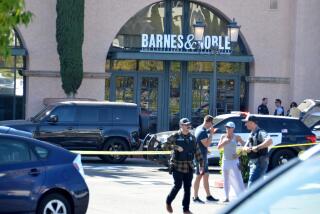Garish Oakland Funeral : 1,000 Witness Last Ride of Slain Drug Ring Kingpin
It might have been the funeral of a fallen national hero or a Hollywood star.
But it was for Felix Wayne Mitchell, a man who wore gold chains, drove shiny new cars--and ran one of the most violent criminal organizations in the West. He bought that jewelry and those cars by selling millions of dollars worth of heroin to residents of this city’s poorest housing projects.
He died in federal prison, stabbed 10 times by another inmate. Despite his violent death--and life--more than 1,000 people lined up outside Mitchell’s home in East Oakland Friday and cheered as a carriage drawn by two horses pulled away, carrying Mitchell’s body in an intricately cast bronze casket.
Most were curious, a few were passing acquaintances. They came out to see a garish show of wealth and power in what remains a neighborhood of housing projects, dilapidated apartment buildings, single mothers, high unemployment and blue-collar workers.
Oakland officials, appalled at the massive funeral, feared that children--some of whom he would beguile in his heyday by giving them rides in his limousines--will learn that crime does pay.
City Councilman Wilson Riles Jr. said it perpetuated “a message put to young people in this city that there is (a) hero situation in drug dealing.” Councilman Leo Bazile was quoted in the Oakland Tribune as saying the two-hour procession was “hero worship of a murdering thug.”
But for all the expressions of outrage, the entourage went on, tangling midday traffic as it moved eight miles through downtown and alongside Lake Merritt--some of the turf Mitchell was said to have ruled as head of the street gang-turned big time criminal organization, the 69 Mob. The 69 Mob still exists, albeit in weakened condition, despite Mitchell’s departure.
An expressionless man in a gray top hat and black tails guided the horses. The carriage was followed by four Rolls-Royces and 10 white limousines, plus assorted Cadillacs, Lincolns and other fine cars.
Large men, many with shaven heads and wearing black tuxedoes, with red roses in the lapels, and matching bow ties, attended to Mitchell’s family and other mourners. Several times, they broke into tears and hugged each other for comfort. Relatives wore red and black.
“Heroin was his game. He started in Oakland in one of the housing projects. He had a group in Sacramento. He was running with the right people in L.A.,” Detective Everett Gremminger recalled before the funeral in an interview at police headquarters.
Gremminger, who called Mitchell “a low-life scumbag,” began chasing the drug lord in 1976, but it was not until the detective persuaded federal law enforcement officials and police in other cities to take interest, that Mitchell fell.
‘Justice Was Served’
“They’re trying to martyr him, this scumbag, this murderer, this convicted heroin dealer. As far as I’m concerned, justice was served. He got a life sentence, and that’s what he did,” the detective said.
Mitchell was arrested on federal charges in 1983. Sentenced to life behind bars in June, 1985, Mitchell survived only 14 months at Leavenworth Federal Prison before he was killed.
No one has been charged in the murder, which is under investigation. FBI spokesmen said they doubt that the murder was a “hit” and was more likely a personal dispute between inmates.
Mitchell, 32, a high school drop-out who was raised in one of Oakland’s roughest projects, had been convicted of income tax evasion, operating a continuing criminal enterprise and conspiracy to sell heroin. Authorities suspected him of ordering several murders.
“It’s amazing,” Ruben Shavens, one of the limousine drivers, said of the lavish arrangement.
The limos rented for $120 each. In all, the funeral must have cost more than $10,000, he said, although Mitchell’s mother and the funeral home declined to release figures.
Taught Lesson
Eliva Clark, 48, the mother of one, came up to a reporter and said, “You know, he taught the young kids that you don’t have to live poor, and you don’t have to die poor.”
“He made this,” Sam Johnson, 31, said motioning to the carriage and limousines, “out of nothing. He just made it happen. . . . The man was a realist. He worked with what he had. Being a black man in this world, nothing comes easy. He did what he had to do.”
One 11-year-old boy, wearing a New York Yankees hat, strained his neck over the fence of the backyard of his small apartment to get a closer look at the casket carrying his one-time neighbor.
“It’s great; the whole thing is great,” he said. “He was kinda cool. He wore cool clothes. He would give my mother money sometimes. I feel sorry for him, that he was stabbed like that.”
Did he know how Mitchell got his money?
“Yeah,” he said, smiling as if he knew a special secret. “But I probably shouldn’t say.”
Not everyone thought Mitchell was “cool.” A woman, age 54, holding her 10-month-old great granddaughter, worried for the neighborhood children. Standing across from the hearse, she said, “They’ll think that this is heroic, and so they’ll pattern their lives after it.”
‘Scare Them’
“He’ll look big in their eyesight,” added Carletta Fail, 32, the mother of two. “I’m hoping it will scare them. You can live big time, but you can also die. But I guess if his mother wants to put him away like this, it’s up to her.”
In an average month, Mitchell’s gang sold $400,000 worth of heroin, according to testimony at his trial. He was said to have hired children, often not yet teen-agers, to act as lookouts, and had elaborate methods of selling his wares.
For example, he would drop drugs down chutes or hoses in upper story apartments, and require money to be pushed through small openings in doors. He also was said to require that addicts show their track marks before buying drugs, so he could make certain that the buyers were not undercover police.
At the Star Bethel Baptist Church, an associate pastor reminded mourners that they were in “a house of God” and told the men to take off their hats. The Rev. Ivory Redeaux took the opportunity to preach the gospel to the more than 1,500 people who jammed the pews, making few direct references to Mitchell and none about his criminal enterprise. More than 1,000 more were outside. Redeaux repeated his theme several times: God is merciful.
Off to one side there was an arrangement of flowers and gold tinsel in the shape of a dollar sign. The black-covered program gave Mitchell’s date of birth as Aug. 20, 1954. It said, “Departed this life, Aug. 22, 1986, Leavenworth, Kan.” After Redeaux finished, a recording of Sade singing “Smooth Operator” played as hundreds of people filed past the casket.
More to Read
Start your day right
Sign up for Essential California for news, features and recommendations from the L.A. Times and beyond in your inbox six days a week.
You may occasionally receive promotional content from the Los Angeles Times.






